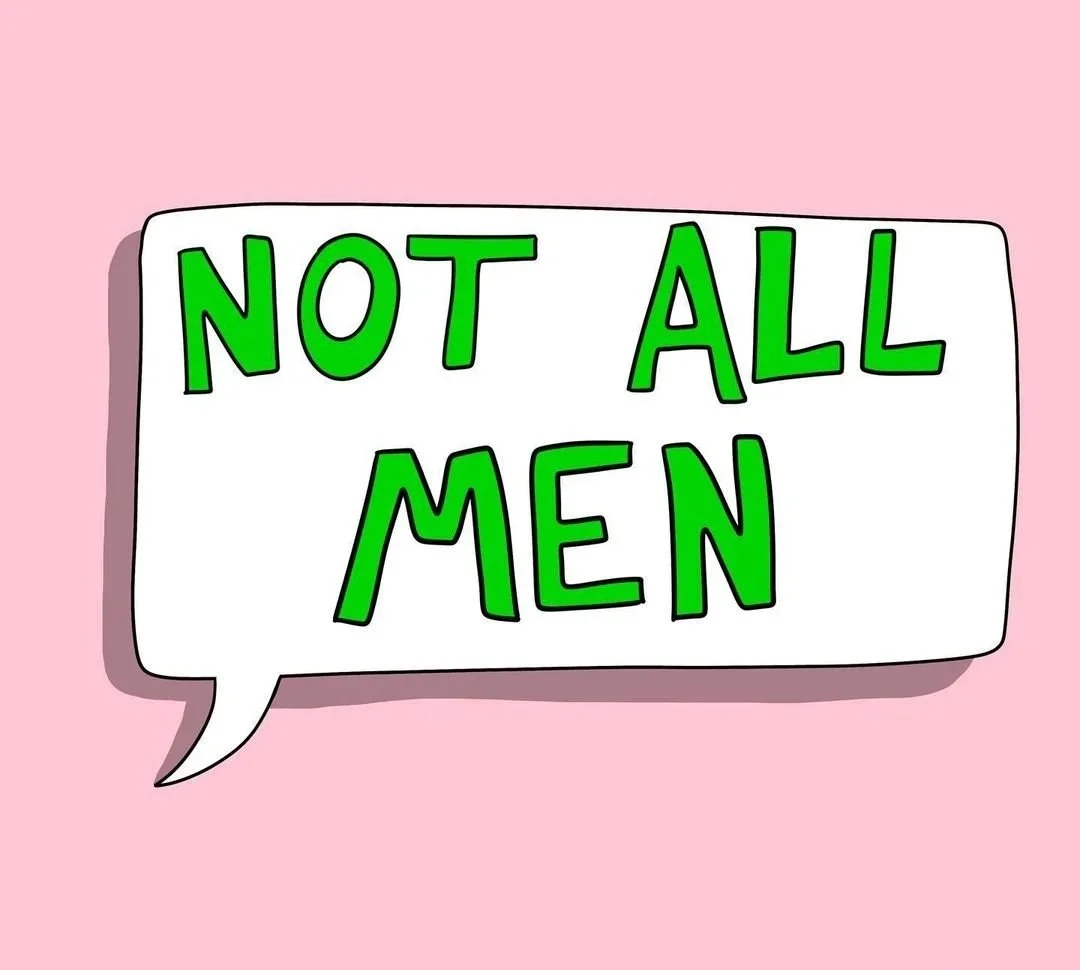What to Say When a Man Says “Not All Men” — Confident, Clear Responses
Learn how to respond when someone says “Not All Men” without losing your cool. Understand why the phrase misses the point and explore confident, compassionate replies.
What to Say When a Man Says “Not All Men” — Confident, Clear Responses
Have you ever shared that you feel unsafe or uncomfortable around men… only to be met with “Not all men”?
If so, you’re not alone, and you’re not wrong for feeling frustrated.
When a man says “Not all men,” it often shifts the focus away from your experience and onto defending male behavior. While it may be true that not all men are harmful, this phrase can silence valid concerns, downplay lived experiences, and block meaningful conversations.
In this article, I’ll walk you through:
What it really means when someone says “Not All Men”
Why men should stop saying #NotAllMen immediately
What “Yes All Men” means and why it matters
Confident, clear responses you can use, with examples
Hi, I’m Joss. I help women make healing and wellness easy with somatic practices and yoga therapy.
Recently, I shared on social media that if men didn’t exist, I would go topless. Here’s what happened — and how I responded.
Here’s my Youtube discussing this topic and the above post (Not all men & How to respond):
This post was meant to be a light-hearted expression but it was, in-fact, rooted in truth.
If men didn’t exist, I would 100% dress differently and feel more comfortable in my body when out in public. I was overwhelmed with the responses (in my DMs and comments) from women who agreed they do not feel comfortable either.
Although my social media post was a light expression…
Women not feeling safe is a serious topic.
It was only a few weeks ago that Sarah Everard was allegedly kidnapped and murdered as she walked home from her friends house in London.
And only a few months ago, in Vancouver, Jamie Coutts filmed a man stalking her in broad daylight for hours…relentlessly.
If you’re a woman of color, the odds are against you even more. A United Nations study concluded that Indigenous women are 7 times more like to be killed, and almost 3 times more likely to be physically and sexually assaulted.
Most women have a painful story to tell of why they don’t feel safe in public. And most women have safety measures in place because the fear of rape, misogynistic behaviour, and sexual assault is real and happens all the time.
Recently, a male friend laughed at me as I locked my apartment door to grab something from my car. He said ‘Why are you locking it, we’ll be gone 5 mins?’. My ‘safety measure actions’ were on auto-pilot. I locked my door because a man could hide in my apartment and rape me. I’ve learned, as a woman, to play it safe and to protect myself. This is just a part of life for me.
When a Man Says “Not All Men” — What It Really Means
The phrase “Not all men” is often used as a defensive reaction. It usually comes from a place of wanting to protect men’s reputations rather than listening to and understanding women’s lived realities.
While it’s literally true that not every man is harmful, women know that. The issue isn’t statistical accuracy — it’s the fact that violence, harassment, and intimidation from men are common enough that we adapt our behavior daily to stay safe.
When someone interrupts your story with “Not all men,” it can feel like they’re implying:
Your experience is an exaggeration
The feelings you have about safety aren’t valid
Men’s comfort matters more than women’s safety
So coming back to my social media post, which was receiving an overwhelming response.
I decided to create a poll to find out how many women also sense they would dress differently if men didn’t exist.
Here’s my Instagram story poll with results…
Here’s where things turned interesting…
Not a single woman disagreed with my expressions. But guess who did? White men.
Here are some of the messages I received which consist of guilting, gaslighting, and the ever-famous ‘not all men’ response:
Why Men Should Stop Saying #NotAllMen Immediately
Men might say it thinking they’re clarifying the conversation with these types of responses, but here’s why it’s damaging:
It derails the conversation. Instead of discussing the harmful behavior, the focus shifts to defending men.
It minimizes lived experiences. Women already know not every man is dangerous. Pointing it out dismisses the pattern and the harm it causes.
It centers men in women’s conversations. This phrase recenters male feelings rather than addressing the issue at hand.
If men genuinely want to support women, a better more compassionate response is:
“I’m sorry that happened to you.”
“That’s not okay. How can I help change this?”
“I believe you.”
Confident, Clear Responses to “Not All Men” (With Examples)
If you’re faced with the “Not all men” comment, here are some confident but non-combative ways to respond:
1. Redirect to the real issue
“I know it’s not all men, but it’s enough men that I have to think about my safety every day.”
2. Use a metaphor
“If a jar of 100 candies had 5 that were poisonous, I’d be careful with all of them. It’s not personal — it’s survival.”
3. Acknowledge, then return to your point
“True, not all men. But this conversation is about the men who do, and how that affects women.”
4. Ask a reflective question
“Why do you think your first reaction is to defend men rather than hear what I’m saying?”
…and here are plenty more response examples, I could go on for days!
You are here to defend your fellow men instead of resonate with a very lived experience for women...and in particular women of color.
I respect it must be uncomfortable for men to recognize you’re part of a demographic that causes harm. And it must be uncomfortable to recognize a patriarchal and racist system that exists for women...and in particular, for women of color like myself.
The unequal and unsafe environment I live in (along with many other women) does exist...whether "all men" contribute to it or not.
The problem with a ‘not all men’ sentiment is that it’s centering you as the victim instead of resonating and helping the women experiencing this.
Not all men are like this but without active action, support, and advocacy for women experiencing this...its just making this experience continue for women.
So, since you have a conscious community of men, can you share what you are doing to help marginalized groups, women of color, or perhaps even women in general?
I am a woman of color who has experience marginalization, fetishization, harassment, and sexual assault. Statistics in Canada (from reputable sources including the United Nations) show that Indigenous women are 3 times more likely to be physically and sexually assaulted. And 7 times more likely to be killed.
This topic is far bigger than being about men...as a group. This is about major, structural and systemic inequalities.
Here’s an Illustrated Guide to Why Saying ‘Not All Men’ Is Not Helping Anyone
by Lily O’Farrell and Kristina Maione | full article here
My Story and Why I’m Speaking Up
When I posted online that if men didn’t exist, I’d go topless, I wasn’t saying all men are dangerous. I was speaking to the fact that there’s a constant undercurrent of caution I carry in public space, something many women can relate to.
The responses were telling. Instead of curiosity or empathy, I got “Not all men” comments flooding in.
And that’s exactly why these conversations matte, because we can’t address a problem if we refuse to see it.
Final Thoughts
If someone says “Not all men” to you, remember:
You don’t owe them emotional labor or education
You can respond briefly and still protect your energy
Your experience is valid, even if someone else feels uncomfortable hearing it
The point isn’t to convince every man, it’s to stand firm in your truth, keep the focus on the real issue, and protect your emotional boundaries.
💬 Your turn: Have you ever been hit with “Not all men”? How did you respond? Share in the comments! You might help another woman find her voice.
Thanks for being here,
Joss | Yoga Therapist C-IAYT
(Some responses were inspired by excellent articles by Slate and Elle)
✨ Stay Connected & Empowered
If reading this blog sparked something in you: feeling seen, understood, or ready to reclaim your confidence…
I’d love to keep supporting you.
Join the Wild Womb newsletter and get:
Weekly insights on feminine energy and somatic healing
Tips to release tension, feel safe, and stay grounded
Exclusive rituals, practices, and gentle guidance straight to your inbox
💌 Sign up here for free →
Your voice matters. Your body matters. Your energy matters , and this newsletter is here to help you nurture all three.








